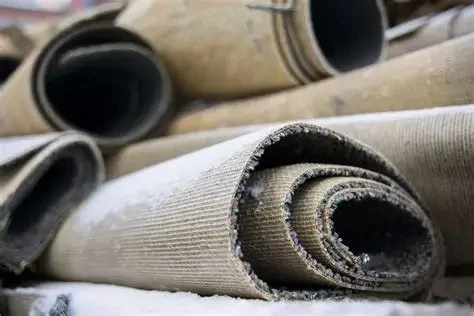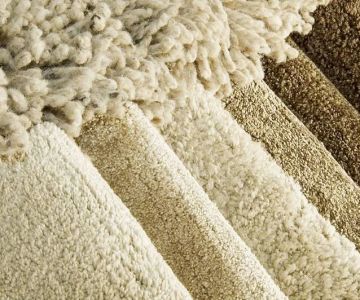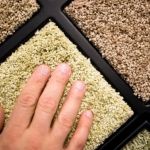
- 1 - Environmental Impact of Carpet Manufacturing
- 2 - Sustainable Practices in Carpet Production
- 3 - Eco-Friendly Materials in Carpet Manufacturing
- 4 - Case Study: The Shift Toward Sustainability in the Carpet Industry
- 5 - How the Carpet Industry is Reducing Waste
- 6 - How CarpetHub Can Help You Choose Eco-Friendly Carpets
1 - Environmental Impact of Carpet Manufacturing
The carpet manufacturing industry, though a vital part of our homes and offices, has a significant environmental footprint. From the extraction of raw materials to the production and disposal of carpets, the entire process contributes to environmental degradation. The production of carpets typically involves the use of synthetic fibers like nylon and polyester, which require large amounts of energy and water to manufacture. Additionally, carpets often contain toxic chemicals and adhesives that can harm the environment when improperly disposed of. The industry is responsible for considerable waste generation, as many carpets end up in landfills, where they can take hundreds of years to decompose.
2 - Sustainable Practices in Carpet Production
As environmental awareness grows, many carpet manufacturers are adopting sustainable practices to reduce their impact on the planet. This includes using renewable energy sources, minimizing water usage, and employing greener production techniques. One key approach is the move towards closed-loop manufacturing systems, where carpets are designed for easy recycling and reuse. Sustainable carpet producers are also exploring methods to eliminate harmful chemicals from their products, replacing them with safer, non-toxic alternatives. By improving the energy efficiency of their operations, these companies not only reduce their environmental footprint but also lower production costs in the long run.
3 - Eco-Friendly Materials in Carpet Manufacturing
Choosing eco-friendly materials is one of the most effective ways to reduce the environmental impact of carpet manufacturing. Manufacturers are increasingly turning to natural fibers such as wool, jute, and sisal, which are biodegradable and have a much lower environmental impact than synthetic fibers. Additionally, recycled materials like PET (from plastic bottles) are being used to create carpets that are both durable and environmentally friendly. These materials help reduce the demand for virgin resources and minimize waste. Some companies are also exploring the use of bio-based polymers and plant-based dyes to further reduce the environmental harm caused by carpet production.
4 - Case Study: The Shift Toward Sustainability in the Carpet Industry
A notable example of the shift toward sustainability in the carpet industry is the story of Interface, a global carpet tile manufacturer. Interface has made remarkable strides in reducing its environmental impact by adopting a "Climate Take Back" initiative. This initiative aims to make Interface’s products carbon negative by 2040. The company has committed to using 100% recycled or bio-based materials in their products and has implemented a system where old carpet tiles can be returned for recycling. Interface’s commitment to sustainability has made it a leader in the industry, showing that it is possible to reduce environmental harm while maintaining product quality and profitability.
5 - How the Carpet Industry is Reducing Waste
Waste reduction is a crucial area where the carpet manufacturing industry is making significant progress. Many carpet manufacturers are now focusing on designing carpets with longer lifespans, which not only saves consumers money but also reduces the frequency with which carpets are discarded. Additionally, the concept of "upcycling" is becoming more popular. Upcycling involves taking old carpets and repurposing them into new products, such as mats, insulation, or even new carpet tiles. Through recycling programs, manufacturers can reclaim materials from old carpets and turn them into new products, effectively reducing the amount of waste that ends up in landfills. Moreover, some companies are focusing on creating fully recyclable carpets, ensuring that the products are reused at the end of their lifecycle.
6 - How CarpetHub Can Help You Choose Eco-Friendly Carpets
If you're looking for sustainable, eco-friendly carpet options, CarpetHub is the perfect platform to help you make an informed decision. CarpetHub provides a range of carpets made from environmentally friendly materials, with detailed product information to help you understand the environmental benefits of each option. Whether you're interested in carpets made from natural fibers, recycled materials, or those produced with sustainable manufacturing practices, CarpetHub has a selection that aligns with your eco-conscious values. Visit CarpetHub today to find the perfect carpet that suits both your style and your environmental values.









 Floor Coverings International of Staten Island5.0 (113 reviews)
Floor Coverings International of Staten Island5.0 (113 reviews) Bailey's Custom Carpets, Inc.4.0 (15 reviews)
Bailey's Custom Carpets, Inc.4.0 (15 reviews) Brian's Professional Floor Covering4.0 (27 reviews)
Brian's Professional Floor Covering4.0 (27 reviews) Home Outlet4.0 (93 reviews)
Home Outlet4.0 (93 reviews) The Carpet Connection4.0 (26 reviews)
The Carpet Connection4.0 (26 reviews) Central Carpet Care4.0 (58 reviews)
Central Carpet Care4.0 (58 reviews) Transform Your Basement with Durable Carpet Options | CarpetHub
Transform Your Basement with Durable Carpet Options | CarpetHub Can Carpets Improve the Acoustics of Your Home?
Can Carpets Improve the Acoustics of Your Home? The Ultimate Guide to Eco-Friendly Carpets: Sustainable Choices for Your Home
The Ultimate Guide to Eco-Friendly Carpets: Sustainable Choices for Your Home What You Need to Know About Eco-Friendly Carpet Materials
What You Need to Know About Eco-Friendly Carpet Materials Choosing the Best Carpet for Homes with Pets
Choosing the Best Carpet for Homes with Pets Best Carpet Materials for Maintaining Comfort and Warmth in Winter | CarpetHub
Best Carpet Materials for Maintaining Comfort and Warmth in Winter | CarpetHub